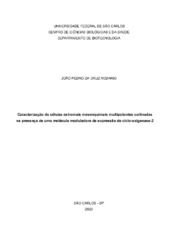Caracterização de células estromais mesenquimais multipotentes cultivadas na presença de uma molécula moduladora da expressão de ciclo-oxigenase-2

Visualizar/
Data
2019-03-28Autor
Rosario, João Pedro da Cruz
Metadata
Mostrar registro completoResumo
Mesenchymal stromal cells (MSC) are stem cells used in therapeutic applications due to their regenerative and immunomodulatory potential. These cells exhibit paracrine activity, which releases soluble factors that allow them to manage immune system cells. Among the diversity of factors, prostaglandin E2 stands out, synthesized by MSC after contact with tumor necrosis factor ɑ (TNF-ɑ) and increased expression of the enzyme cyclooxygenase-2 (COX-2). Our research group developed a large-scale screening qPCR assay based on the TNF-ɑ - COX-2 axis, to select molecules that positively modulate COX-2, and the results pointed to the natural compound indirubin. Therefore, the objective was to carry out a cellular priming to observe the effects of indirubin on the characteristics of umbilical cord MSC (UC-MSC) and to validate the modulatory activity of the compound on COX-2. For this purpose, UC-MSC samples (n=3) were conditioned for 72 hours to three treatments: control condition, 0.25% DMSO and 50μM indirubin. For characterization analyses, cells were tested for morphology, immunophenotypic profile, cell viability and adipogenic differentiation. Subsequently, COX-2 modulation was evaluated through protein expression (Western blot) and gene expression (qPCR). Then, samples were selected for a proliferation assay and an immunomodulation assay, performed by co-cultivating UC-MSC with peripheral blood mononuclear cells. Finally, a qPCR analysis of the expression of inflammatory genes by PBMC was performed. The results indicated that priming did not contradict any cell characterization criteria, and that there is no bias in viability or proliferation. The gene and protein modulation of COX-2 was expressed differently between the samples, with “UC-MSC 03” showing gains in both analyses. The co-culture assay indicated that the UC-MSCs control the proliferation of lymphocytes, but it was not possible to affirm the immunomodulatory gain from the treatment with indirubin. And the qPCR of the inflammatory genes indicated expression gains in some targets, which can be used in another immunomodulation approach.
Collections
Os arquivos de licença a seguir estão associados a este item:
